Uptime Energy Drink is, no doubt, one of the most popular drinks among energy drink lovers. It has a variety of flavors and is packed with ingredients that keep you energized throughout the day. The energy-boosting properties of this beverage, as well as its sweetness, make it an equally strong competitor to other well-known brands of energy drinks.
Yet, you may be wondering what exactly a single can of Uptime Energy Drink contains.
Briefly, It contains high levels of sugar, 38 g, with a moderate caffeine content, 142 mg. It’s definitely energizing, but you need to drink it in moderation or you could suffer serious health problems including sugar crashes. For reference, the most caffeine you can have in a day is 400 mg and 36 g for sugar.
It also contains beneficial ingredients like L-Theanine, Coenzyme Q10, Panax Ginseng, Angelica Root Extracts, Calcium Citrate, Ascorbic Acid, and some preservative. These are all beneficial to your health and the quality of the drink.
That said, the sugar-free version of Uptime Energy Drink is the better choice if you’re really conscious about your health.
If you’re curious about the nutritional value of both versions of Uptime Energy Drinks and how they affect your health, check out the following analysis.
Contents
Uptime Energy Drink Nutrition Facts
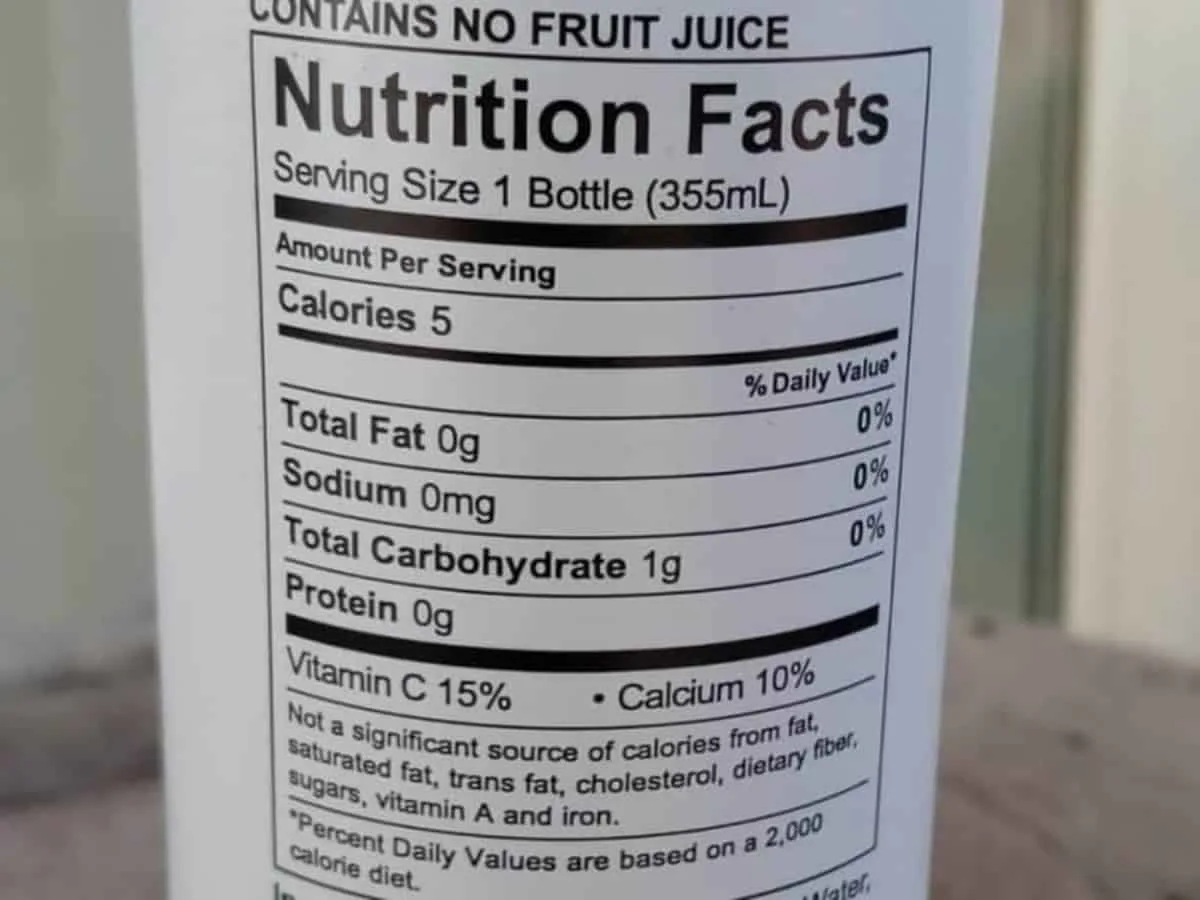
The following table gives you a better understanding of the nutritional information for Uptime Energy Drink (Original and Sugar-Free):
| Values | Uptime Cane Sugar (12 fl.oz) | Uptime Sugar-Free (12 fl.oz) |
| Energy | 150 Calories | 5 Calories |
| Protein | 0g | 0g |
| Carbohydrate (Of which Sugars) | 38g (37g) | 1g (0g) |
| Sodium | 0g | 0g |
| Caffeine | 142mg | 142mg |
| Vitamin C | 9mg | 9mg |
| Calcium | 115mg | 115mg |
As you can see from the table above, the Uptime Energy Drink (Original and Sugar-Free) contains a lot of good nutrients. The caffeine content is just right to give an energy boost. Only the sugar content is somewhat high.
It’s overall a solid energy drink that’s pretty enjoyable.
Uptime Energy Drink Ingredients
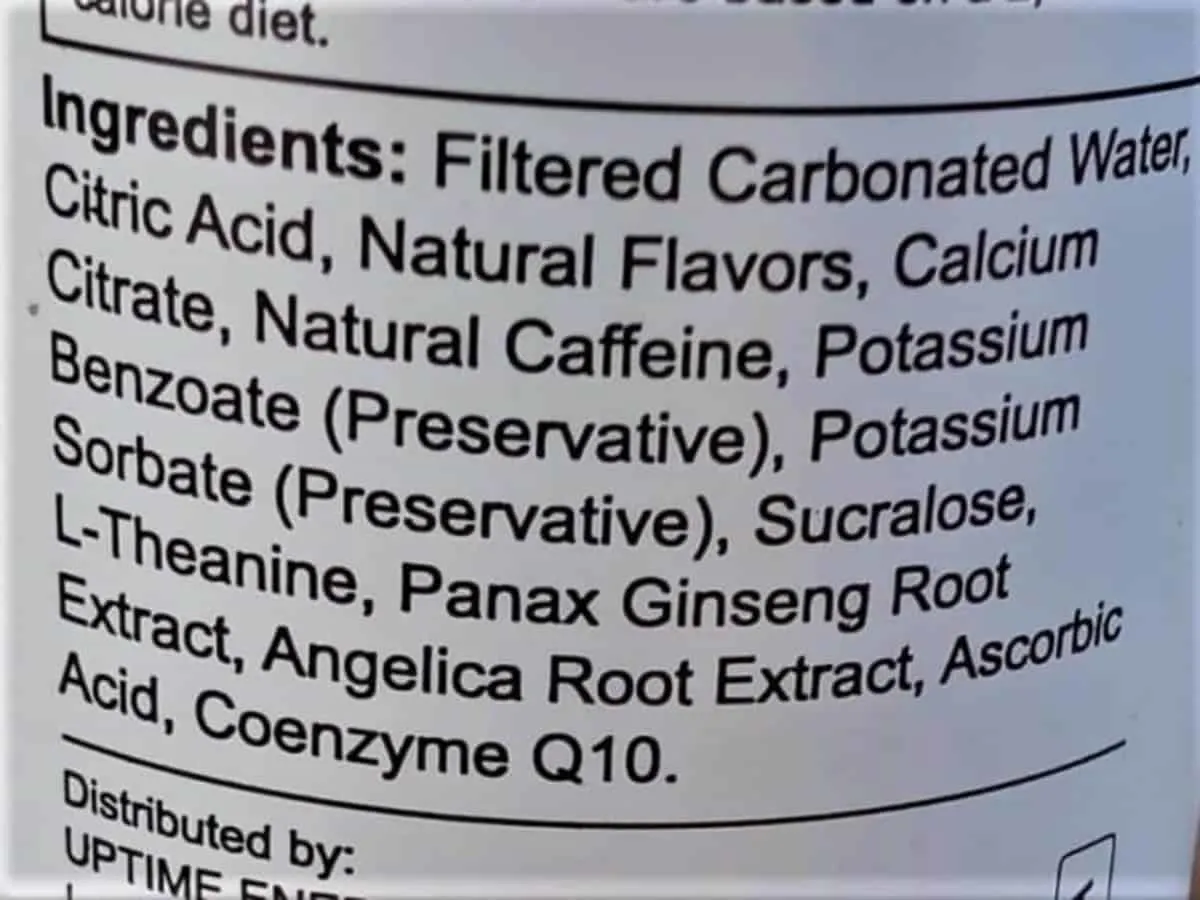
Here I’ve put together a list of all the ingredients that you can find noted on the back of Uptime Energy Drink cans.
Uptime Original Sugar-Cane
- Filtered Carbonated Water
- Cane Sugar
- Citric Acid
- Natural Flavors
- Calcium Citrate
- Natural Caffeine
- Potassium Benzoate (Preservative)
- Potassium Sorbate (Preservative)
- L-Theanine
- Panax Ginseng Root Extract
- Angelica Root Extract
- Ascorbic Acid
- Coenzyme Q10
Uptime Sugar-Free
- Filtered Carbonated Water
- Citric Acid
- Natural Flavors
- Calcium Citrate
- Natural Caffeine
- Potassium Benzoate (Preservative)
- Potassium Sorbate (Preservative)
- Sucralose
- L-Theanine
- Panax Ginseng Root Extract
- Angelica Root Extract
- Ascorbic Acid
- Coenzyme Q10
Based on the lists above, you can see that Sugar-Cane and Sugar-Free versions of Uptime are almost similar to each other, but Sucralose replaces Sugar-Cane in Sugar-Free.
Notable Ingredients
If you’re like me who likes to list down new, interesting ingredients to research, then this part is for you! Here, we’ll learn more about L-Theanine, Coenzyme Q10, Panax Ginseng, Angelica Root Extract, Calcium Citrate, Ascorbic Acid, and the preservatives of Uptime.
L-Theanine
L-Theanine is usually found in green or black tea leaves.
Aside from being beneficial to memory and thinking skills, it can relieve stress and anxiety as well.
The drink may also elicit feelings of relaxation, although it’s difficult to predict exactly whether you’ll feel relaxed after you’ve consumed one.
Coenzyme Q10
CoQ10 plays a significant role as a natural antioxidant during your cellular development and maintenance. Here are some of its benefits:
- Lowering blood pressure
- Improve symptoms of heart conditions
- Preventing migraines
Panax Ginseng
Uptime Energy contains Panax Ginseng Extract that is good for your memory and thinking skills, making it a good combination with caffeine.
Angelica Root Extracts
Angelica Root Extract appears to be effective in relieving indigestion. It may also be used directly on the skin to treat disorders such as pain in the joints, nerve pain, and skin disorders.
However, this energy drink doesn’t seem to benefit much from this plant.
Calcium Citrate
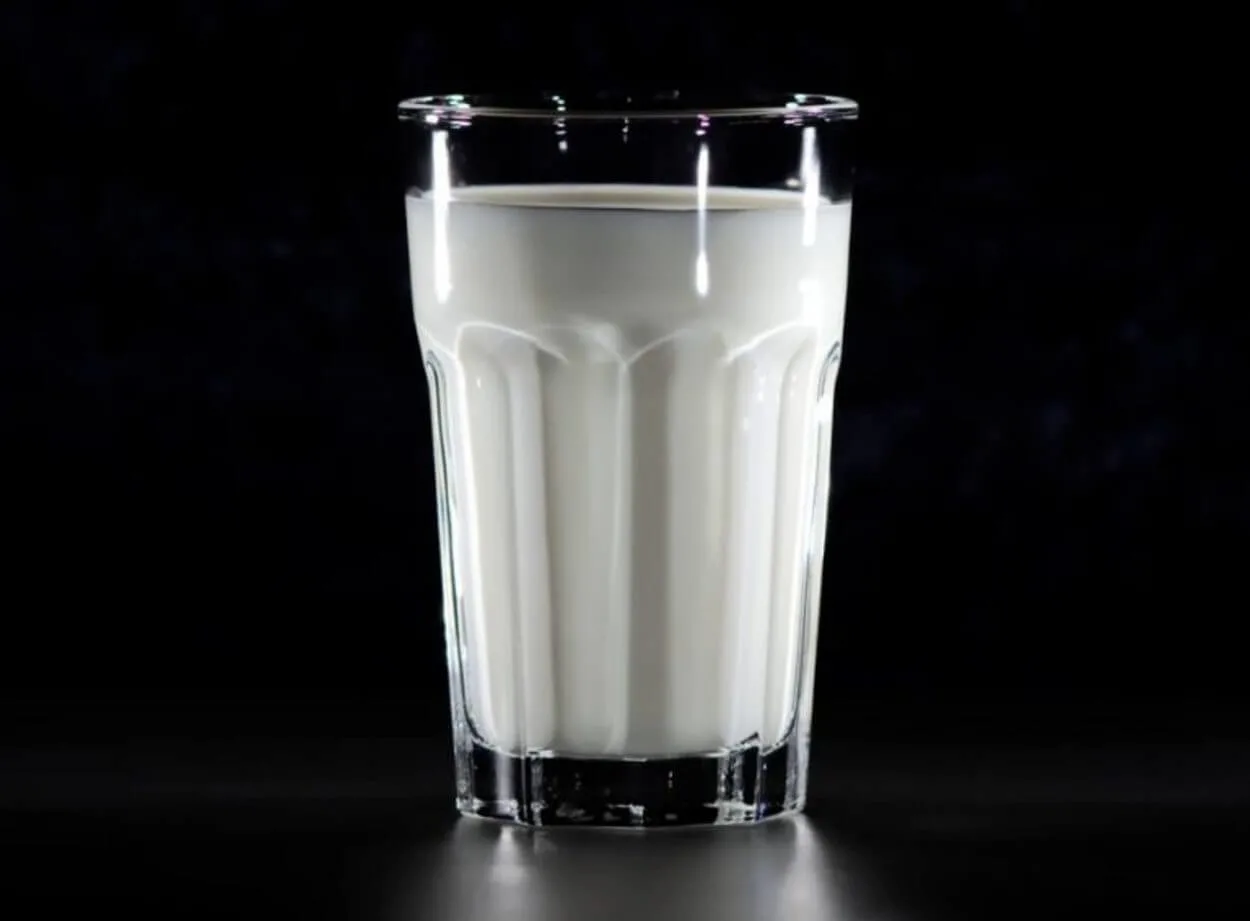
In Uptime Energy Drink, calcium citrate serves as a primary calcium source, as well as a preservative and a flavor modifier.
Each 12-ounce serving of Uptime Energy contains 115 mg of calcium that is around 10% of your daily requirement.
It’s quite common for young adults not to consider adding extra calcium to their diet. I think everyone should think of having more calcium. This has a number of benefits, including:
- Reducing cholesterol levels
- Reducing blood pressure
- Preventing tooth loss
- Indigestion
It doesn’t appear that Uptime Energy is providing you with any calcium benefits. It can be difficult to predict if 115 mg of calcium in Uptime will make a difference since calcium is usually effective at dosages of 0.4 to 2 g.
Ascorbic Acid
Vitamin C is commonly known as ascorbic acid, a water-soluble vitamin that acts generally as an antioxidant, destroying bacteria and detoxifying the body.
Ascorbic acid is found in almost every fruit. It’s essential to consume Vitamin C in order to prevent immune deficiencies, cardiovascular disease, and wrinkles on your skin.
Vitamin C should be consumed in amounts of 75 to 90 mg per day, according to experts.
You may not get enough Vitamin C from Uptime Energy since it contains only about 9mg per bottle. Still, I think that adding Vitamin C to Uptime makes it a great energy drink, and it works pretty well.
Potassium Benzoate & Potassium Sorbate (Preservatives)
A combination of potassium sorbate and sodium benzoate is usually used with low pH products to harness their synergistic antimicrobial properties.
Studies have shown sodium benzoate may affect people with inflammation, oxidative stress, obesity, and ADHD. It may also reduce to benzene, a potentially carcinogenic compound. However, low levels of it in beverages are generally considered safe.
Potassium sorbate, a tasteless and odorless salt, is manufactured from sorbic acid and potassium hydroxide. It doesn’t possess any particular flavors or odors. It keeps foods fresh longer by preventing mold, yeast, and fungus from growing.
Uptime Energy Drink Vitamins
Uptime contains only two vitamins. Together, these vitamins are more effective than you might expect.
Calcium
Calcium plays a significant role in maintaining the structure and strength of the bones. Calcium is essential for the health of our bones, muscles, teeth, hearts, nerves, and other organs.
Calcium may also facilitate a good connection between the brain and the body.
Vitamin C
Ascorbic acid and Vitamin C are associated with many positive effects. They enhance the growth, development, and repair of tissues.
Vitamin C is also helpful for developing a strong immune system and the synthesis of collagen and scar tissue.
Check out the following table to get a better understanding:
| Vitamins Applied in Uptime | Amount Used Per Serving (12 fl. oz) | Tolerable Daily Recommended Intake |
| Calcium | 115mg | 1000mg |
| Vitamin C | 9mg | 65-90mg |
If you want to learn more about Uptime Energy Drink’s ingredients, you may want to visit this!
Uptime Energy Drink Caffeine Content
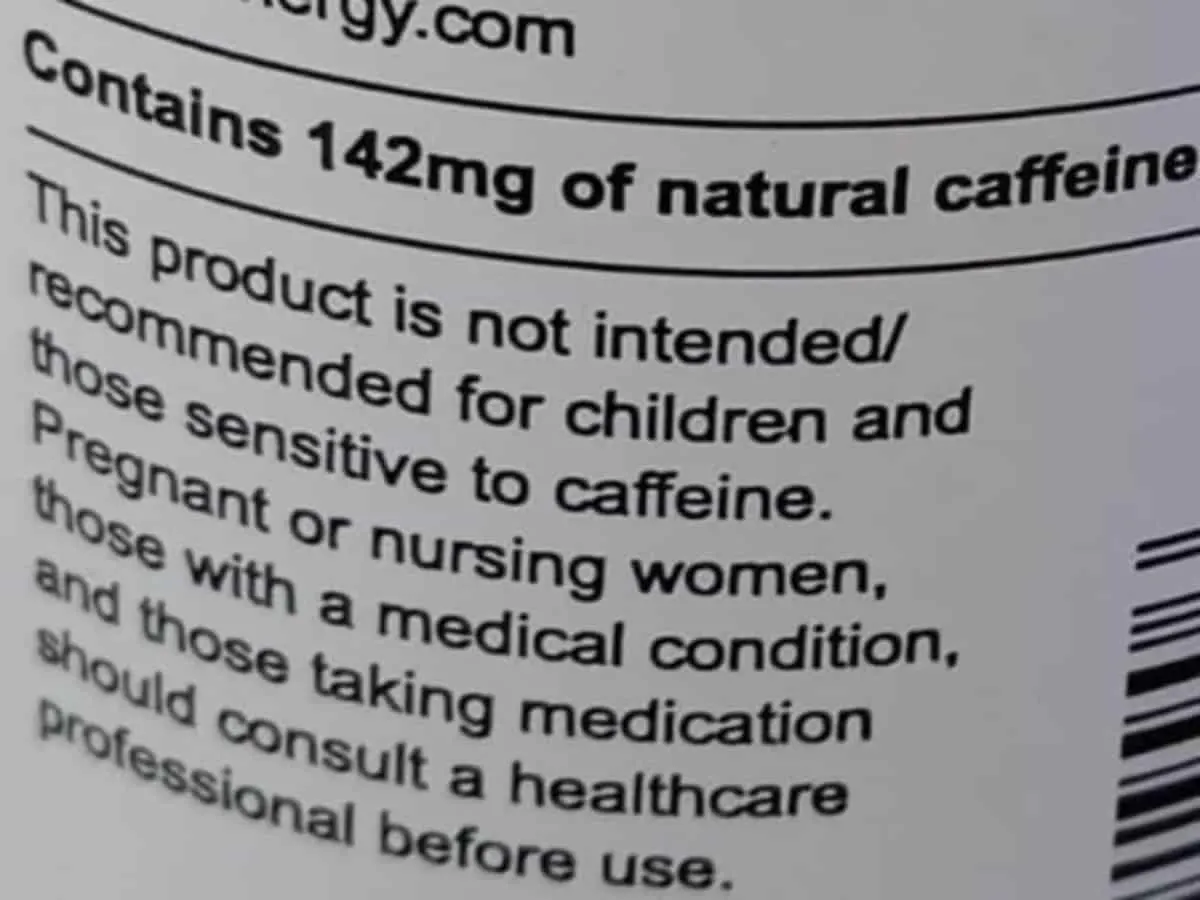
Uptime Energy Drink (Original & Sugar-Free) contains 142 mg of caffeine per 12-ounce can.
Caffeine is one of the ingredients in Uptime Energy that gives you a temporary boost during the day. The caffeine in this drink acts as an adenosine receptor, helping you stay alert and awake.
Here are a few of caffeine’s benefits:
- Improved cognition
- Weight loss
- Alertness
- Improves physical performance
- Reduced inflammation
- Lowered the risk of chronic diseases
Of course, having more caffeine isn’t always beneficial. It depends on how your metabolism works and how much caffeine you can tolerate.
Between 50 and 100 mg per serving is the right amount for me so that I don’t feel overstimulated or too jittery.
Because of Uptime’s moderate caffeine content compared to other energy drinks, it’s probably fine for you even if you have a low tolerance to caffeine. It depends on how much and how often you consume this.
Caffeine should not be consumed in excess of 400 mg daily, according to the FDA. Overconsumption of caffeine can cause some very serious side effects:
- Insomnia
- Restlessness
- Headaches
- Stomachaches
- Dizziness
- Dehydration
- Anxiety
It’s important to limit your intake of Uptime Energy bottles, just as you should limit your intake of other caffeinated drinks. Also, avoid beverages containing caffeine like coffee, tea, and soda with Uptime Energy.
Since Uptime Energy drinks are caffeinated, it’s important not to drink too many of them.
Uptime Energy Drink Calories
The original 12-ounce Uptime Energy bottle contains 150 calories while its sugar-free counterpart has just 5 calories.
It’s recommended that men consume 2400 to 3000 calories daily, and women 2000 to 2400. It would be better if you remain within the recommended daily calorie intake.
If you’re trying to lose weight, keep track of how many Uptime Energy Drinks you’re drinking. 150 calories don’t sound like much, but they accumulate over time.
You are more likely to gain weight if you consume too many calories. A healthy lifestyle will help you to burn excess calories without gaining weight.
The sugar-free version of Uptime Energy might be better if exercising isn’t your thing. It only contains 5 calories, much fewer than the cane-sweetened counterpart.
How much sugar does Uptime Energy Drink have?
Uptime Energy Drink original has 37 grams of cane sugar, whereas the sugar-free version has none.
Sugar cane is also a type of sugar and like regular sugar, it contains sucrose, and there are health problems if too much sucrose is consumed.
Regular and cane sugar are very similar, so cane sugar is not always a better choice. Both are the same in chemical components.
According to the AHA, women should consume no more than 25 grams of sugar per day, while men should consume no more than 36 grams. Uptime Energy’s bottle is sure to go over the limit for you.
Then again, sugar can be beneficial too. It takes just a little sugar to make you feel energized and lift your mood.
Of course, Sugar becomes harmful the moment you start consuming too much continuously, resulting in serious health problems like:
- Weight Gain
- Type II Diabetes
- Increased risk of heart disease
- Acne
- Increased risk of depression
You will likely experience a sugar crash if you consume too many sugary drinks in a short period of time, that’s why you should consume Uptime Energy in moderation.
You can always choose sugar-free Uptime Energy Drinks as they are better for your diet.
Artificial Sweeteners in Uptime Energy Drink

Uptime contains no artificial sweeteners in its original version, but its sugar-free one contains the sweetener, sucralose as a flavoring agent.
Since sucrose has no calories or nutritional value, it’s a better choice if you are conscious about your diet.
Similarly, the consumption of these artificial sweeteners will not result in sugar crashes once the effects have worn off, but you should be aware that long-term effects may negatively impact your health.
You shouldn’t be worried as long as you don’t consume too many foods and drinks that contain artificial sweeteners since they have been approved for general use by the FDA.
Anyway, if you moderately consume Uptime Energy, you should not encounter any problem with this ingredient.
Is Uptime Energy Drink good for you?
You can safely consume Uptime if you drink it in moderation. It contains very little, ineffective nutrients. Although it may not be that good, it isn’t too bad, either.
Uptime seems to be average in comparison with other energy drinks and doesn’t seem to catch the eye as much as others. Still, it’s tasty and occasionally enjoyable, but it may be a bit pricey.
In fact, Uptime is one of the tasty and delicious energy drinks out there. Fruity, delicious, and refreshing. A bit pricey, though.
The Uptime Energy Drink is delicious, but it leaves out many of the B vitamins that other energy drinks have.
Unlike most energy drinks, Uptime still contains many nutritious ingredients like Panax Ginseng, Angelica Root Extract, Calcium, and Vitamin C.
Uptime Energy Drink Side Effects
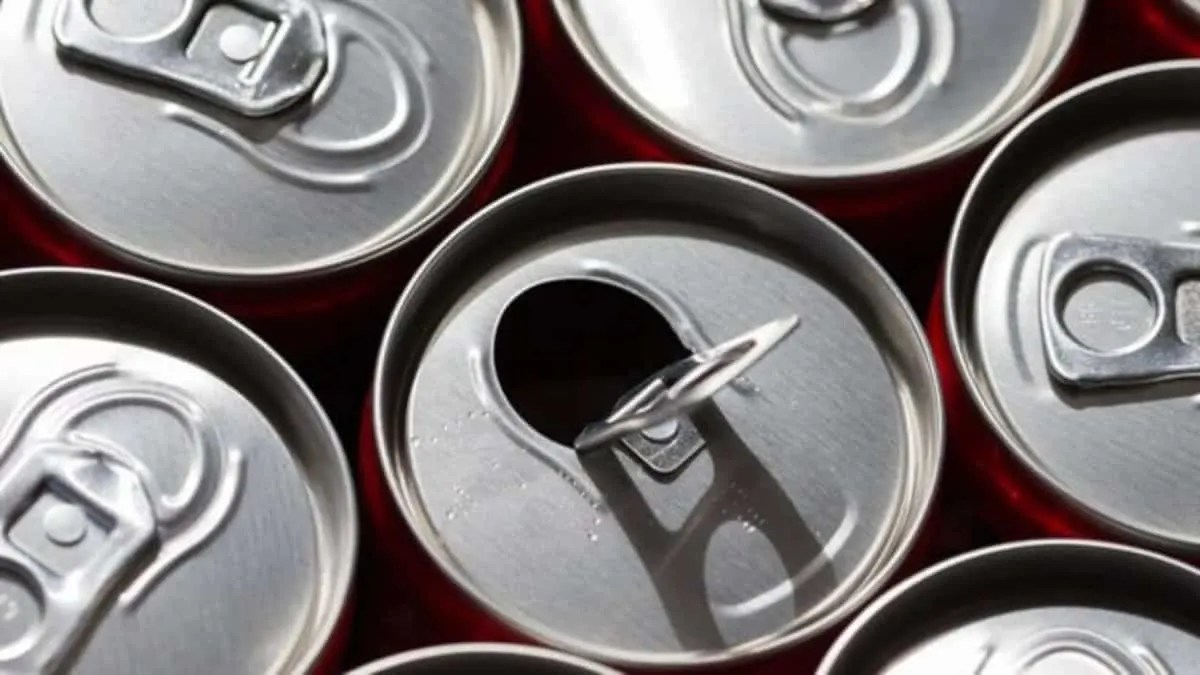
It contains caffeine and calories in reasonable quantities, but the sugar content is fairly high and if not consumed carefully. It can cause serious health problems.
Overconsumption of Uptime Energy Drink may result in the following side effects:
- Obesity
- Cavities
- Caffeine overdose
- Adolescent and child brain development issues
Excessive consumption of Uptime Original can lead to sugar crashes. The intake of sugar, even if it’s small, boosts your mood. I think that sugar-free Uptime is a better option than the original version.
It’s all about how you manage your consumption. You’ll stay healthy if you drink responsibly.
Although Uptime Sugar-Free contains no excessive amounts of caffeine or sugar, you should still drink it sensibly if you want to avoid crashes and bad reactions.
Can you drink Uptime Energy daily?
If you aren’t sensitive to caffeine and don’t have any continuing medical conditions, you can drink Uptime Energy Drink every single day.
Considering how many calories and sugar are in Uptime Original, it’s important to consume it moderately. Instead, you might consider its Sugar-Free counterpart, containing fewer calories and the same ingredients.
Uptime has moderate caffeine content, but you might be unable to consume it more than one can in a day if you have caffeine sensitivity.
Uptime has a warning on its label that it shouldn’t be consumed by children. The label also cautions women who are pregnant or nursing, taking medications, and individuals who have pre-existing medical conditions not to have this energy drink.
What does Uptime Energy Drink do?
Uptime original and sugar-free versions contain 142 mg of caffeine each. Overall, this energy drink should be able to keep you alert, energized, and focused throughout your long working hours due to its caffeine content (142 mg per can).
Uptime Original has 150 calories and 37g of sugar per serving. While it’s sugary, it gives you a real energy boost.
The Sugar-Free counterpart contains 5 calories and as its name says, it has no sugar. I believe it’s a better alternative. With its caffeine content, it can help keep you energized and you wouldn’t face any adverse effects from high sugar intake either.
To sum up, based on the 142mg of caffeine per can, this energy drink will keep you awake during late hours, as the brand claims. It boosts alertness, concentration, and energy.
Flavors of Uptime Energy Drink
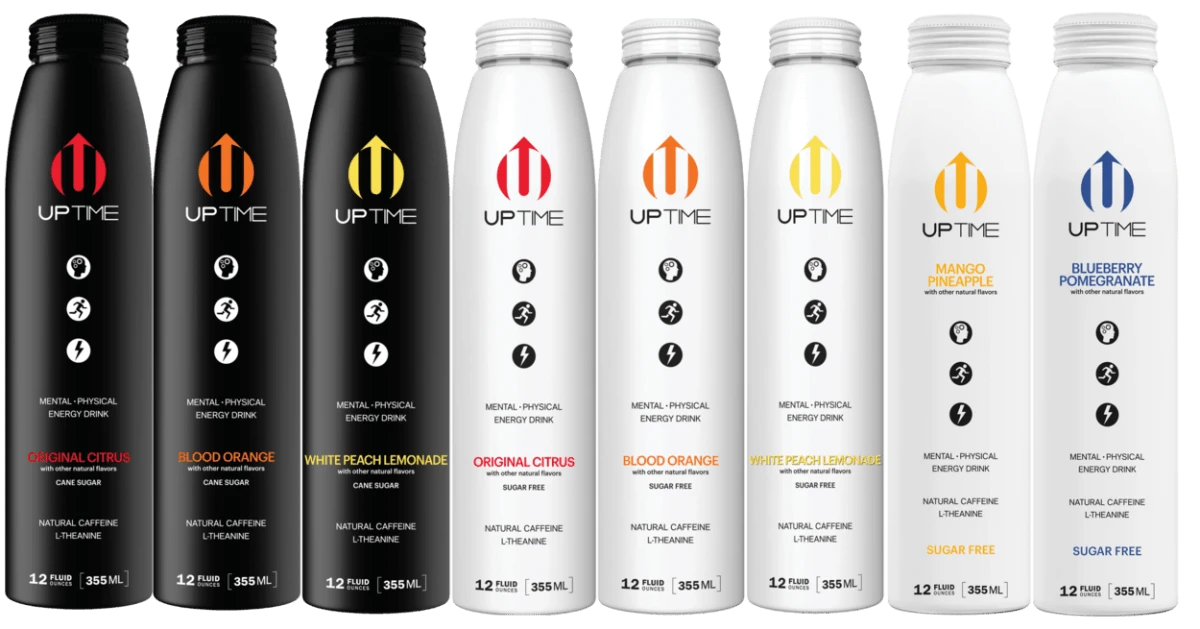
Uptime is available in two counterparts – Original, as well as Sugar-free. The original version comes in three flavors, while the sugar-free version has five.
Take a look at the flavors below.
Original Sugar-Cane
- Blood Orange
- White Peach Lemonade
- Original Citrus
Sugar-Free
- Original Citrus
- Blood Orange
- Mango Pineapple
- Blueberry Pomegranate
- White Peach Lemonade
Uptime contains a limited number of flavor options, so if you don’t normally like fruity flavors, or if you have extremely certain taste preferences, you might not enjoy this drink.
To be honest, I really like the taste. You should give it a try.
Wrapping it up!
A 12-ounce bottle of Uptime Energy has 37g sugar, 150 calories, and 142mg of caffeine, making it an effective energy booster.
Consuming the drink moderately will work, and you don’t need to consume it frequently unless it’s absolutely necessary.
With its natural caffeine, calcium, and vitamin C content, consuming only a single bottle of Uptime energy drink can keep you performing at your best.
Overall, I would say that this is a pretty solid energy drink, based on taste, quality, and everything else it offers.
